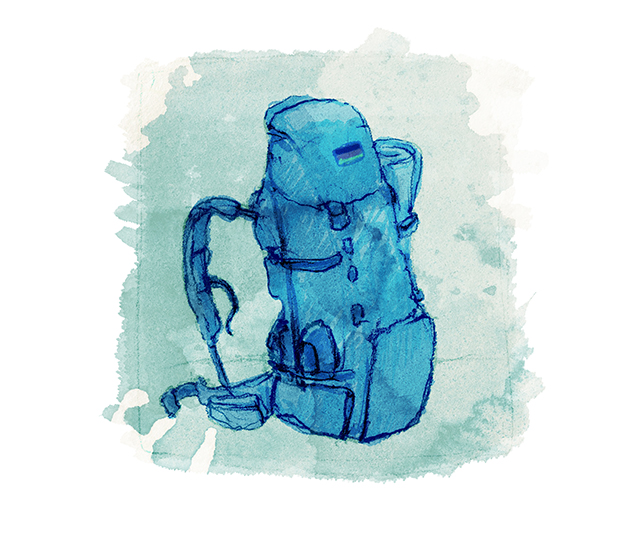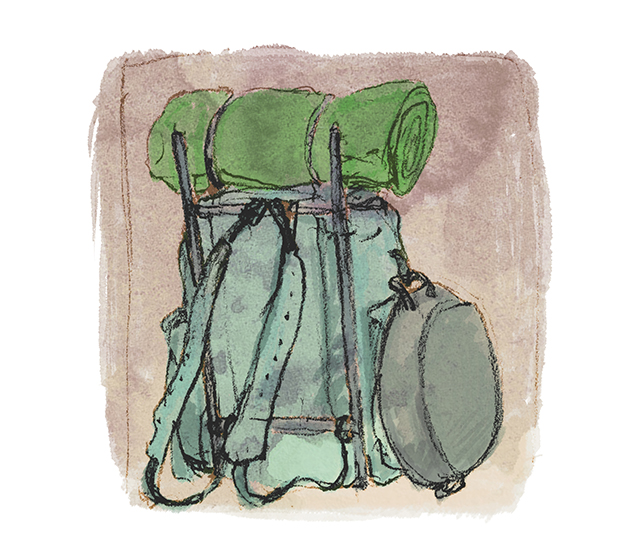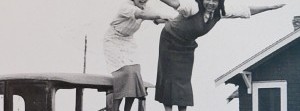
Photo Credit: Facundo Gastiazoro
Passing Through
Yawning and leg stretching at the visitor centre. The city connects highways and breaks up a train route, but the distances are vast. Some travellers collect brochures and pile them in their car doors. Others invest in small mementos: a printed mug or a wooden Mr. PG. A few leave behind their stories.
The Granola People
They’re just passing through, the granola people, but they’d like to call a conservation officer about the bear cub in the back of their van. That’s what they’ve been feeding it—granola. It’s homemade; low in sugar. Oats are an excellent source of fibre.
They’re very concerned about what the conservation officer will do with it, the bear cub. They’ll take the animal home with them if anyone even thinks about killing it.
They spotted the largish black cub as they were heading west from McBride. It was preoccupied licking dead bugs off a vehicle that had been abandoned on the side of the highway. The couple pulled over and watched it for a while; twenty minutes or so. That was plenty of time, they figured, for the mother to come back if she was going to.
The cub needed to be rescued, they decided, so the husband grabbed hold of it and shoved it into a big blue container they had in the van. They poked some holes in the lid and sealed it up.
The husband and wife escort the conservation officer across the parking lot to their vehicle, ready to fight for the cub’s existence if they have to. They slide open the door. Inside are the couple’s four children and a large blue container. The kids have popped the lid off. They’re feeding the cub some more granola.
The Hitchhiker
Boots and a backpack and torrential rain in the early fall. A young, clean shaven German is taking a break from his education to see Canada from truck cabs and roadsides. He’s been caught out by the weather; his progress abruptly stalled. It is illegal to hitch a ride by the jail, and it’s a long walk all the way up the hill in the heavy rain to catch a ride east.
He hangs out at the visitor centre for a while, waiting for the weather to change. It doesn’t. He waits a bit longer. He gets chatting to the staff. The view beyond the windows looks almost black against the warm electric light. He’s offered a spare ticket to a Spruce Kings game. It’s the beginning of the season; the fans are excited. He really should experience Canada’s favourite sport. He gets talking to people in the arena. He winds up at a pub, and then a stag party, and he stays for another four days. Somewhere along the way, the rain stops.
The RVers
Some Europeans pack light for their North American adventures. Others ship over their vehicles. Retired people who take road trips that stretch across the summer pull up in RVs with foreign plates and assorted stickers. The machines they import for their extended holidays are ancient, new, slender, and chunky. Some are built like tanks with massive tires and plated exteriors, as if their insides conceal a small arsenal instead of household items and pull-down beds.
The German couple, mid-sixties, arrive in a skinny camper, stereotypically efficient, amazingly compact. Built for windy European roads. They don’t make vehicles like that in North America. That’s a problem, because the camper has broken down. Now they’re stuck here, waiting for parts to be shipped from Europe so they can get back on the road again.
The Dutch couple pull up in an ancient truck with a camper on the back, towing their beloved quad and a little dog (also beloved). They want to drive the quad downtown. They don’t see why that would be a problem—it was fine in Alaska. They ask staff to call the RCMP for them, to double check. They’ll wait.
He had a cancer scare; that’s why they’re taking the trip. While they’re here, they would very much like to shake the hands of veterans at the Legion. In Holland, they tend the graves of fallen Canadian WWII soldiers.
The RCMP call back. It’s a definite no-go for the quad. They take their old truck to the Legion.
The Deer
Their hooves crunch the gravel between the railroad tracks, noses sniffing out grain that has fallen from uncovered train cars. An inhospitable environment compared to the surrounding forests, but the lure of convenient food is strong.
A herd is holding up traffic on First Avenue. The railroad tracks misled the deer. The grain consumed, they find themselves ambushed by vehicles, noise, and concrete. Excited visitors snap photos as the RCMP try to clear them off the road.
The Panicking Relations
An English couple come in. It’s their first time in Canada. They’re not looking for postcards or magnets or keychains, but their missing relatives. Their aunt and uncle were supposed to meet them in Smithers and they aren’t answering their cellphone.
There are plenty of places to stop between Smithers and Prince George, plenty of places for the young English couple to inquire about their aunt and uncle and come up short, and instead hear stories of the tragic disappearances that have occurred along Highway 16, which they soon discover is also known as the Highway of Tears.
By the time they reach Prince George, they’re stuck in a bad dream, in a strange country that gives them not hope, but a tiny glimpse into the pain of families who have had someone go missing on that same stretch of road.
Visitor centre staff call hospitals and hotels; every one along the route. The RCMP are alerted. Then there’s a breakthrough; the aunt and uncle are tracked down to a Prince George motel, but they’ve already checked out. They are eventually located in 100 Mile House, heading home again, unaware they’d switched their cellphone off, or that their English relatives might be concerned.
The Campers
A picturesque campsite. Trees nearby rustling in a light summer breeze. Calm day; quiet night. Morning panic.
She wakes to discover caterpillars crawling in her hair. She flees the tent, hitting her head and shaking her hair as she frantically tries to dislodge them. The aptly-named tent caterpillars have swarmed all over the outside of their lightweight shelter, and more than a few have found their way in.
Her boyfriend finds it hilarious. She doesn’t, not even in the retelling. They would like to be relocated to a campsite without any caterpillars in the vicinity.
The Penniless Gold Panner
An early snowfall catches the gold panner on a logging road north of the city. He’s a thirty-ish Albertan as eccentric as his hobby. He’d staked his claim and driven up there in a rusty truck with a makeshift camper stuck on the back. No winter gear; not even a pair of gloves.
After the snow struck, a few snowmobilers came by and dug the man and his dog out. They brought him back to civilization. Now he’s preparing to head back up north and dig his truck out. The staff offer him a pair of mitts. He calls his parents in Alberta to send money so he can get back home.
These stories are based on accounts provided by Sherry McKay of the Prince George Visitor Centre, who has spent the past 14 years going out of her way to help people who are just passing through.









